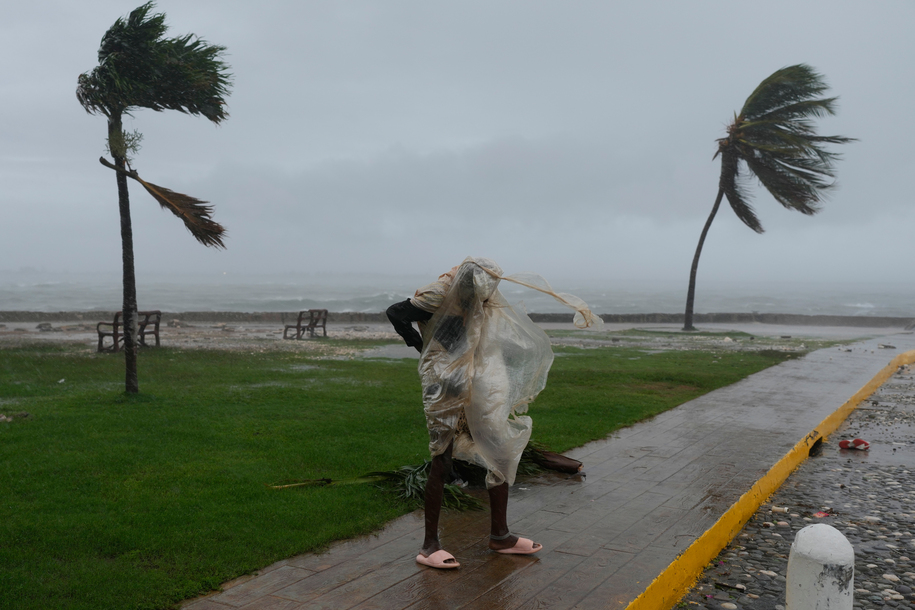World
Hurricane Melissa Leaves Caribbean in Crisis, Global Aid Needed

Hurricane Melissa struck Jamaica on October 30, 2025, causing extensive damage as it moved slowly across the Caribbean, impacting Haiti and Cuba. The storm, categorized as a powerful Category 5 hurricane, resulted in significant destruction, leaving at least 67 people dead across the affected nations. As recovery efforts intensify, international aid is urgently needed to support the millions affected.
Cuba has reported that over 54,000 people are currently displaced due to the hurricane, with approximately 7,500 individuals residing in official shelters, according to the United Nations Office for the Coordination of Humanitarian Affairs (OCHA). The damage assessment indicates that more than 600 health facilities and 90,000 homes have been impacted. UN agencies are mobilizing resources to assist around 140,000 people through shelters and community kitchens, while also providing agricultural tools and livestock feed to help restore livelihoods.
In Haiti, the aftermath of Hurricane Melissa has been equally tragic, with the storm claiming over 40 lives and causing extensive destruction across multiple departments. Local humanitarian organizations are working to expand their operations as they address the urgent needs of affected communities.
The United States has pledged support, with the Department of State announcing nearly $37 million in emergency assistance to the region. This amount, while substantial, has drawn criticism for being insufficient compared to other international commitments, such as the proposed $40 billion bailout for Argentina.
The international response includes aid from various countries. Venezuela has sent a second shipment of aid to Cuba, while Canada has received gratitude from Jamaican officials for their ongoing support in the recovery efforts.
As communities across the United States rally to assist, initiatives have emerged from places like Austin, Texas, and New England, where residents are mobilizing resources to help those affected by the hurricane.
Climate Change and Hurricane Impact
The ongoing discussions at the COP30 climate change conference in Belem, Brazil, emphasize the urgent need for action in light of Hurricane Melissa. Former director of climate change for the Jamaican government, UnaMay Gordon, highlighted the catastrophic impact of the hurricane, stating, “We lost cultural heritage, 300-year-old churches are lost. A part of our identity was lost with it.” The damage has been estimated to account for 28% to 32% of Jamaica’s gross domestic product.
Experts assert that climate change has exacerbated the effects of hurricanes like Melissa. Research indicates that warmer ocean temperatures, intensified by global warming, significantly increased the storm’s wind speeds, making it more destructive. Dr. Glen Barry noted that the likelihood of warm waters fueling such storms has increased dramatically due to climate change.
Theresa Rodriguez-Moodie, CEO of the Jamaica Environment Trust, expressed her concerns, stating, “These storms are becoming the norm, unfortunately, and it is fueled by the climate crisis.” She called for urgent commitments to adaptation financing and support for loss and damage incurred by affected nations.
Path to Recovery
As the Caribbean grapples with the aftermath of Hurricane Melissa, recovery efforts are underway, albeit challenging. Organizations like World Central Kitchen are providing essential food assistance to those in need, distributing meal kits and kitchen supplies to households devastated by the storm.
The road to recovery will require a sustained global effort, and support from the international community is crucial. While many in the United States face their own financial difficulties, raising awareness and sharing information about relief efforts can make a significant difference in the recovery process.
As the situation continues to evolve, it is imperative for the global community to remain engaged and committed to aiding the Caribbean nations affected by Hurricane Melissa. The resilience of these communities in the face of adversity is a testament to their strength, but the need for support remains critical as they begin to rebuild their lives.
-

 Science1 month ago
Science1 month agoIROS 2025 to Showcase Cutting-Edge Robotics Innovations in China
-

 Lifestyle1 month ago
Lifestyle1 month agoStone Island’s Logo Worn by Extremists Sparks Brand Dilemma
-

 Health1 month ago
Health1 month agoStartup Liberate Bio Secures $31 Million for Next-Gen Therapies
-

 Science2 weeks ago
Science2 weeks agoUniversity of Hawaiʻi at Mānoa Joins $25.6M AI Initiative for Disaster Monitoring
-

 World1 month ago
World1 month agoBravo Company Veterans Honored with Bronze Medals After 56 Years
-

 Lifestyle1 month ago
Lifestyle1 month agoMary Morgan Jackson Crowned Little Miss National Peanut Festival 2025
-

 Health1 month ago
Health1 month agoTop Hyaluronic Acid Serums for Radiant Skin in 2025
-

 Politics1 month ago
Politics1 month agoJudge Considers Dismissal of Chelsea Housing Case Citing AI Flaws
-

 Science1 month ago
Science1 month agoArizona State University Transforms Programming Education Approach
-

 Business1 month ago
Business1 month agoTruist Financial Increases Stake in Global X Variable Rate ETF
-

 Sports1 month ago
Sports1 month agoYamamoto’s Mastery Leads Dodgers to 5-1 Victory in NLCS Game 2
-

 Top Stories1 month ago
Top Stories1 month agoIndonesia Suspends 27,000 Bank Accounts in Online Gambling Crackdown









